During my trip to Scotland, I did want to visit a distillery, despite my short visit. Though most of Scotland’s distilleries are a good bit away from the cities, there are a couple of options not far from Glasgow. The best known is probably Glengoyne Distillery, which bills itself as the southernmost Highlands distillery. Just 13 miles from Glasgow, it’s an easy day trip from the city. Even better, its location affords an easy way to reach the historic distillery on foot – by walking the first seven miles of the West Highland Way. It’s a good, easy introduction to the famous hiking trail for those short on time.
This post is a part of my trip report series covering my trip to Scotland in February, 2023. Click here for the trip report index and introductory post.
West Highland Way Basics
The West Highland Way is one of the UK’s most popular nature trails. It extends 96 miles from Milngavie (pronounced mull-GUY) to Fort William. The West Highland Way’s official website breaks the walk into 8 sections, and also provides some suggested itineraries. Generally, walking the entire 96 miles takes 5-8 days. The good news, though, is that the bus and train routes parallel the hiking trail its entire length. Thus, if you don’t have time to do the whole thing (or don’t want to), you can select pretty much any section to explore and then take the bus or train back to Fort William or Glasgow. For my walk, I took the first 6.7 miles of the trail from Milngavie to Glengoyne Distillery. From the distillery, I took the X10 bus back to Glasgow, a roughly one hour ride.
While the primary attraction of the trail is the scenery, there are a few attractions for whisky buffs. The first, as mentioned, is Glengoyne Distillery, 6.7 miles from the trail’s starting point. The second is The Green Welly Stop, a convenience store/supply outpost that also has one of the largest selection of whiskys in the world. It’s at roughly the halfway point of the trail, making it a popular resupply point. Finally, there’s Ben Nevis Distillery just north of Fort William.
As far as difficulty level, the first 12 miles, to Drymen, is fairly easy. The trail’s elevation maxes out at around 450 feet, and the path is wide and easy to follow. However, the further north you go, the more challenging the conditions get, with several steep and narrow sections. The trail is open year-round, though May is generally the most popular time to visit. During my visit in early February, the trail was pretty much empty on a Saturday. Of course, the 45-degree rain made for less than pleasant walking conditions. Although bikes are allowed on the trail, beware that some sections are quite narrow and may require dismounting.
If you need accommodations along the way, there are several inns and hotels along the trail. Local and primary roads also parallel the trail nearly the entire way. Thus, when you’ve had enough, you can catch a bus or train to the nearest accommodation, then go back to where you left off the next day. (The notable exception is the section from Balmaha to Inverarnan, a distance of about 25 miles. Reaching the main road requires taking a ferry to the other side of Loch Lomond.) You can also camp most anywhere along the path, though open fire restrictions may exist in some areas.
Seven Miles of the West Highland Way
Date of visit: Saturday, February 3, 2023
My walking tour began mid-morning in the town of Milngavie. A suburb of Glasgow, it’s quite easy to reach via train from Queen Street Station. A direct ScotRail train runs every 15-30 minutes, with a travel time of ~25 minutes.
Before heading out on my walk, I decided to fill up on brunch. I found a breakfast/coffee shop called Bulland’s not far from the train station. Unfortunately, it appears this place no longer exists. At the time, though, I enjoyed a strong cappuccino and a Scottish version of French toast. Basically, it’s the toast with a big helping of sausage and tomatoes on top. A heavy meal, yes, but just what I needed before a 6.7-mile walk.
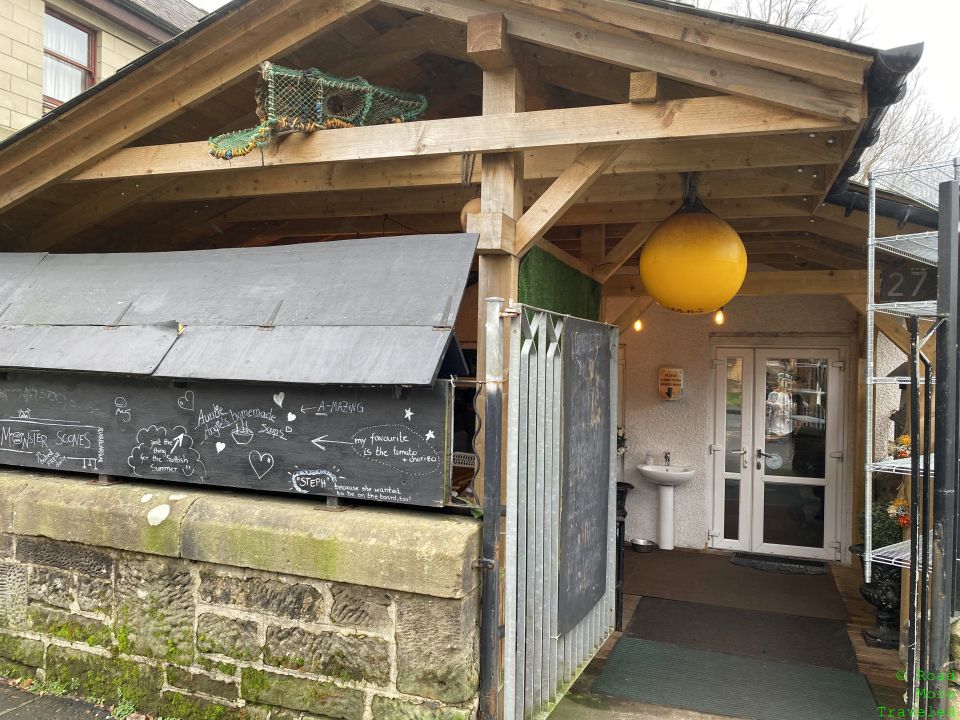
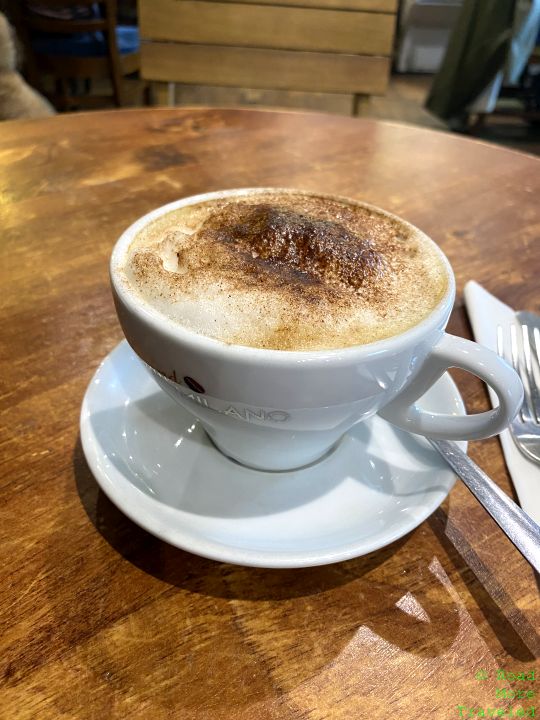
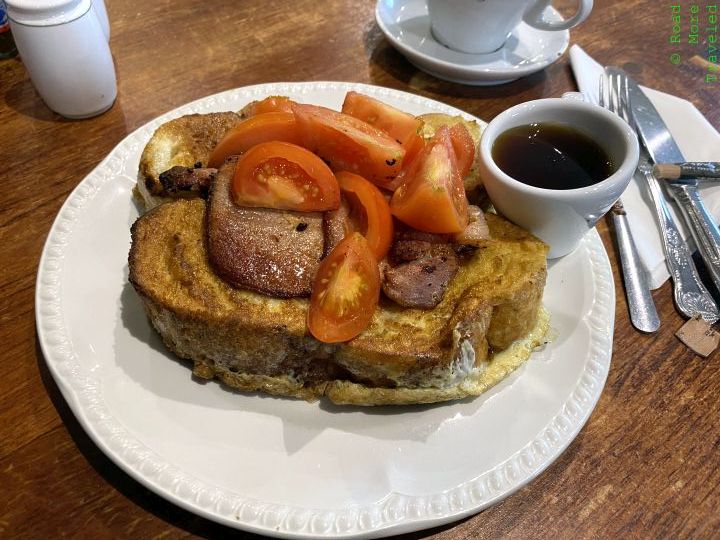
A unique aspect of the place were the myriad teddy bears hanging from the ceiling.
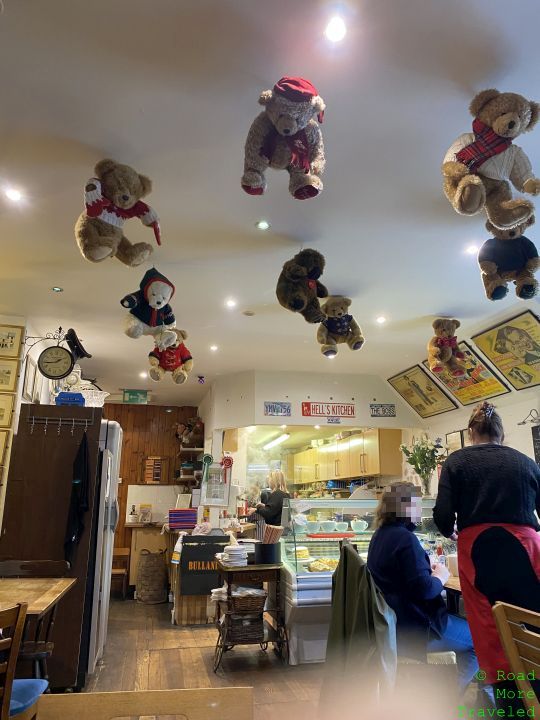
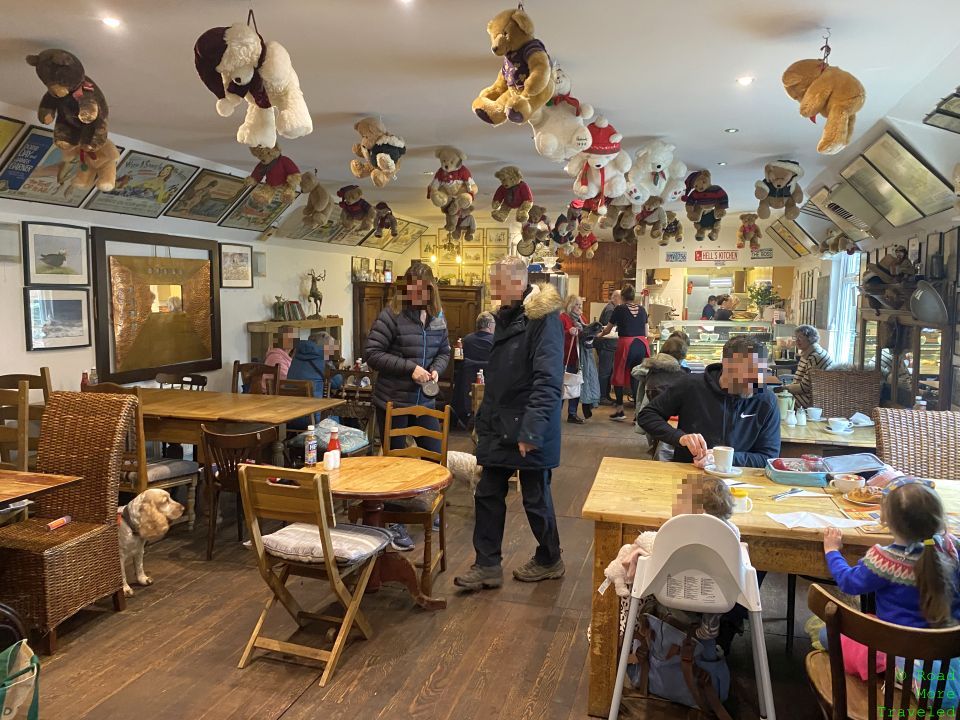
There’s also a nice outdoor seating area when the weather isn’t quite so cold and gloomy.
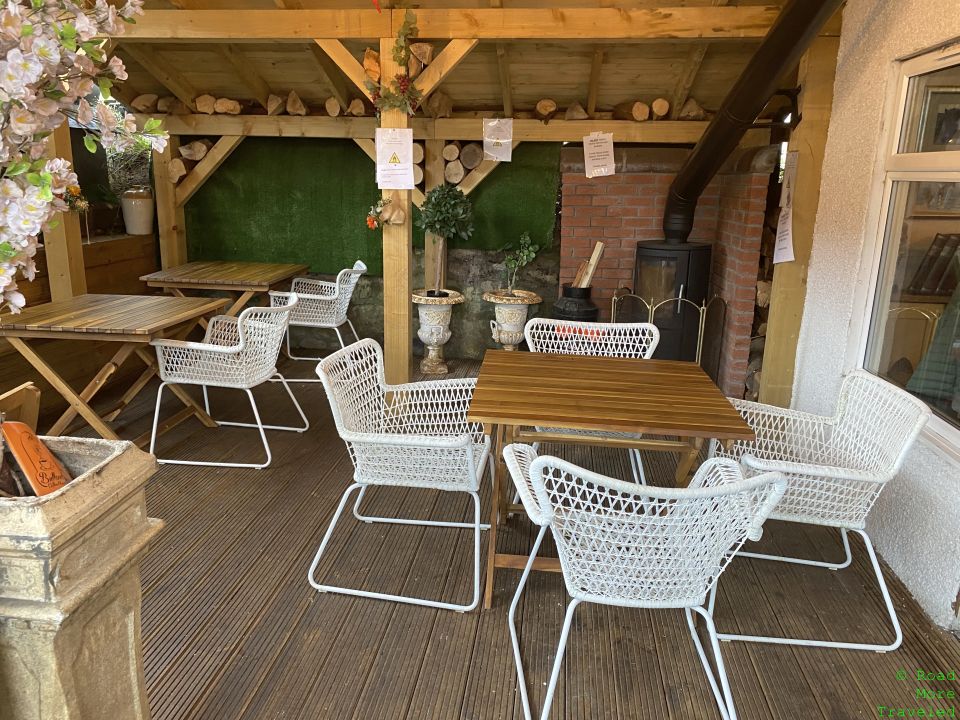
After filling up, I spent a few minutes checking out the Milngavie town center while looking for the start of the West Highland Way. Milngavie is a pretty typical suburban town. While the town itself dates to the early 1600, the current town center was fully rebuilt starting in 1974. Most of the buildings you see also date to that time.
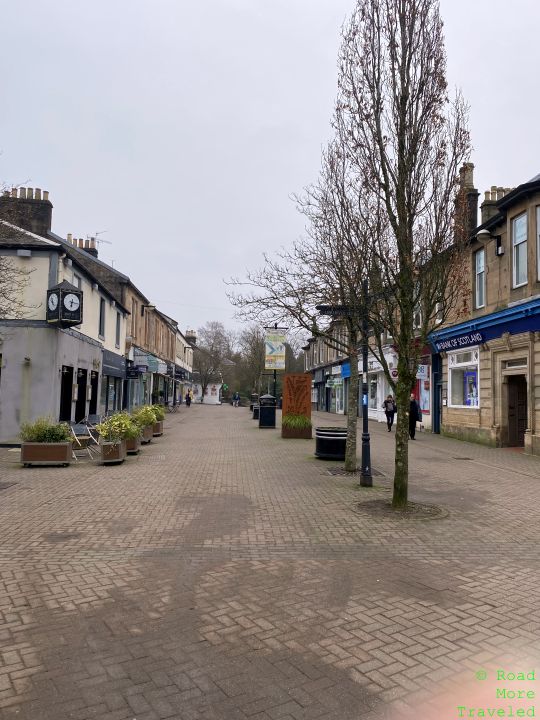
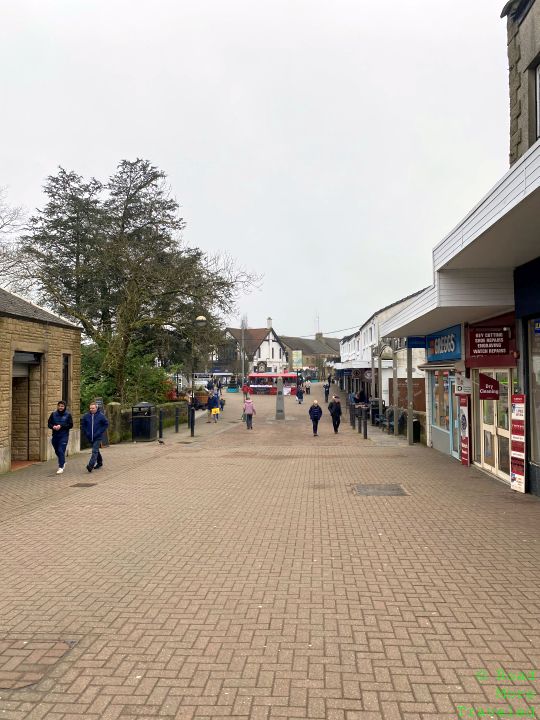
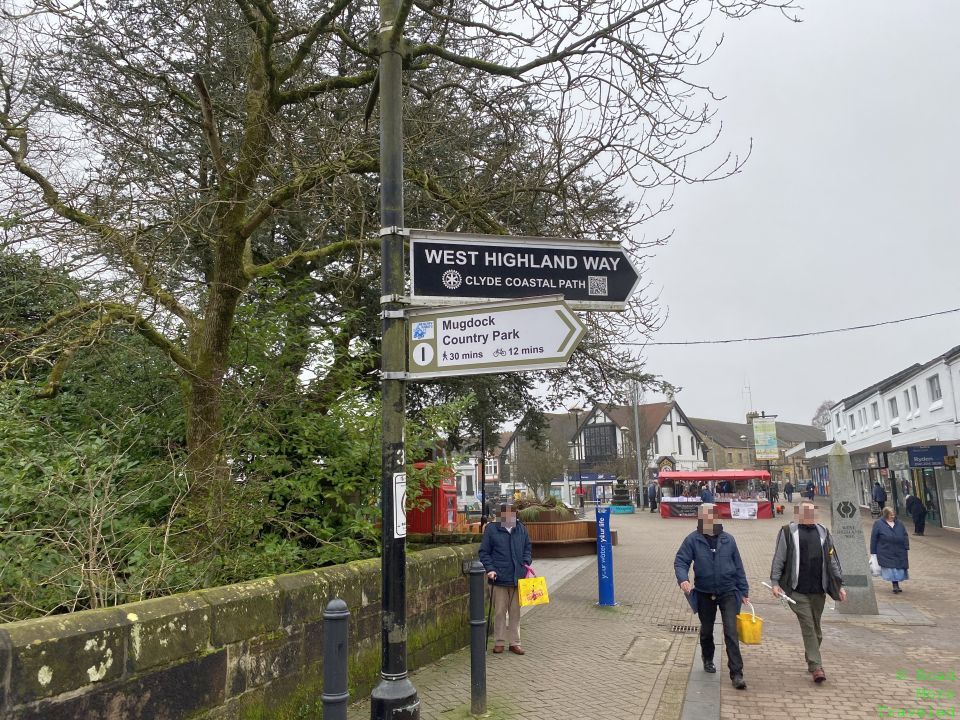
There are several convenience stores and ATMs around the town center. So consider this a good opportunity to stock up on cash, water, and snacks if you’re planning to walk a long distance down the trail.
A prominent landmark in the town center is an obelisk marking the official start of the West Highland Way.
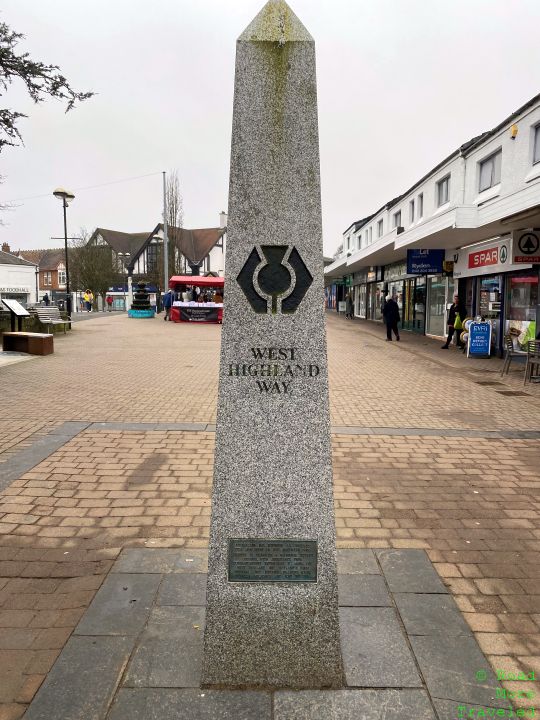
And right next door, the actual entrance to the 96-mile trail.
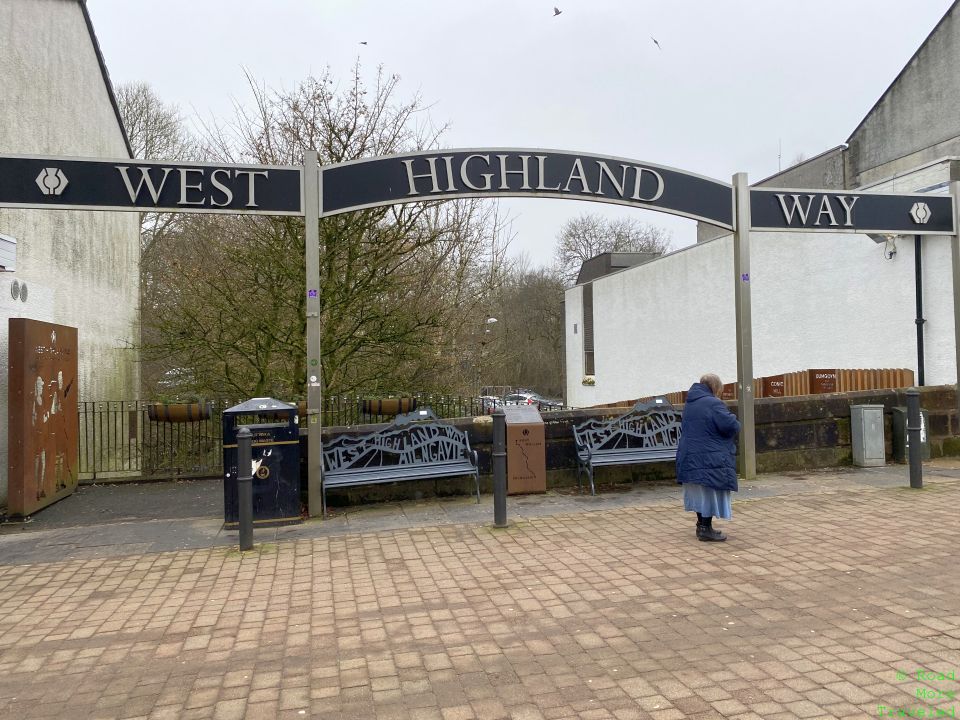
Simply head down the staircase underneath the “West”, and you’re officially on the trail. There’s a large map at the bottom with some information to get started.
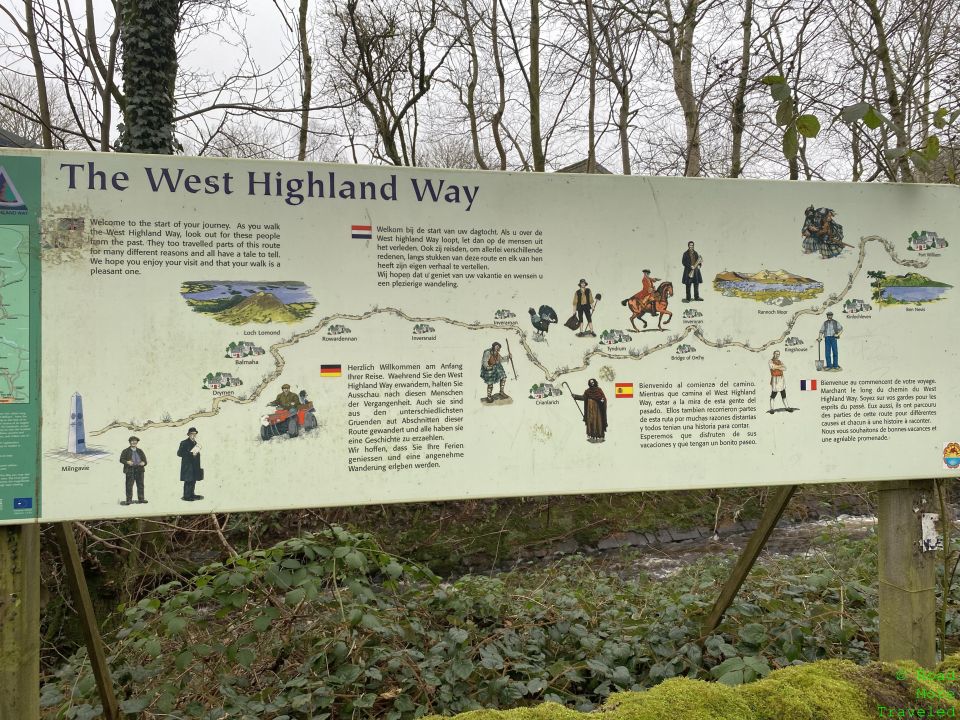
The first section of the trail through Milngavie looks like a pretty typical city park path. Fully paved at this point, the trail is suitable for both walking and biking.
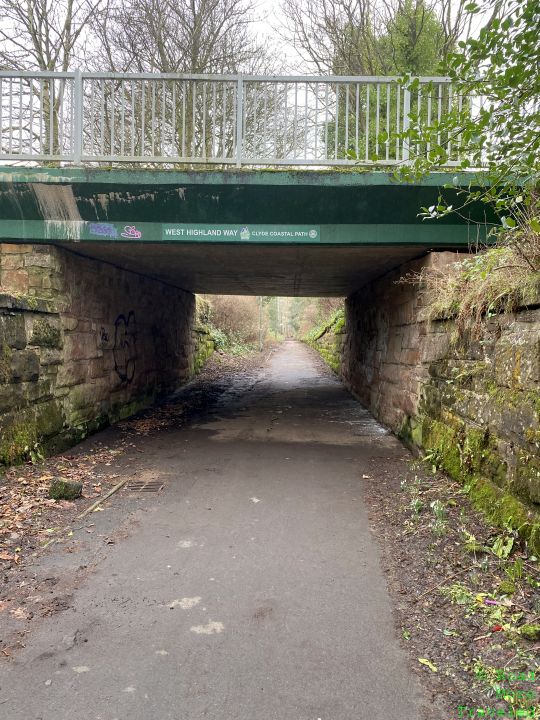
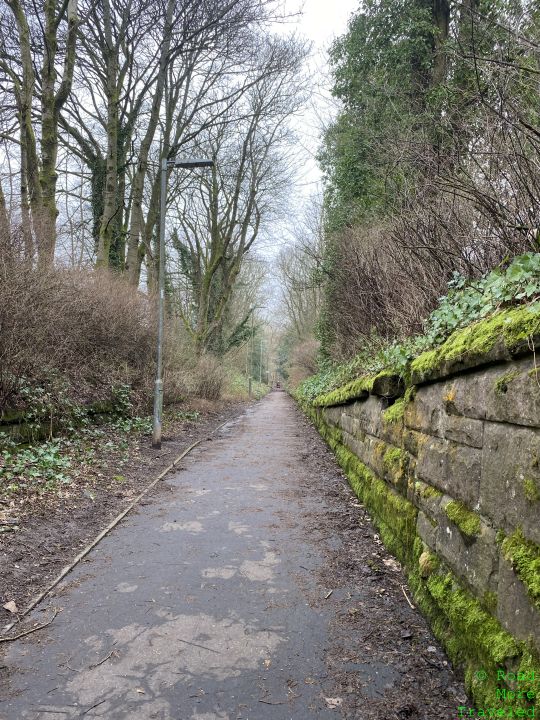
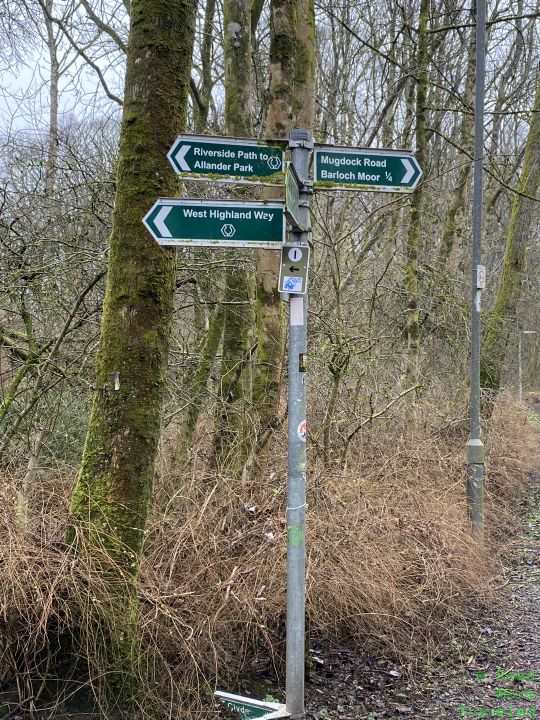
For a time, the trail goes alongside the River Allander, with suburban apartments on the other bank.
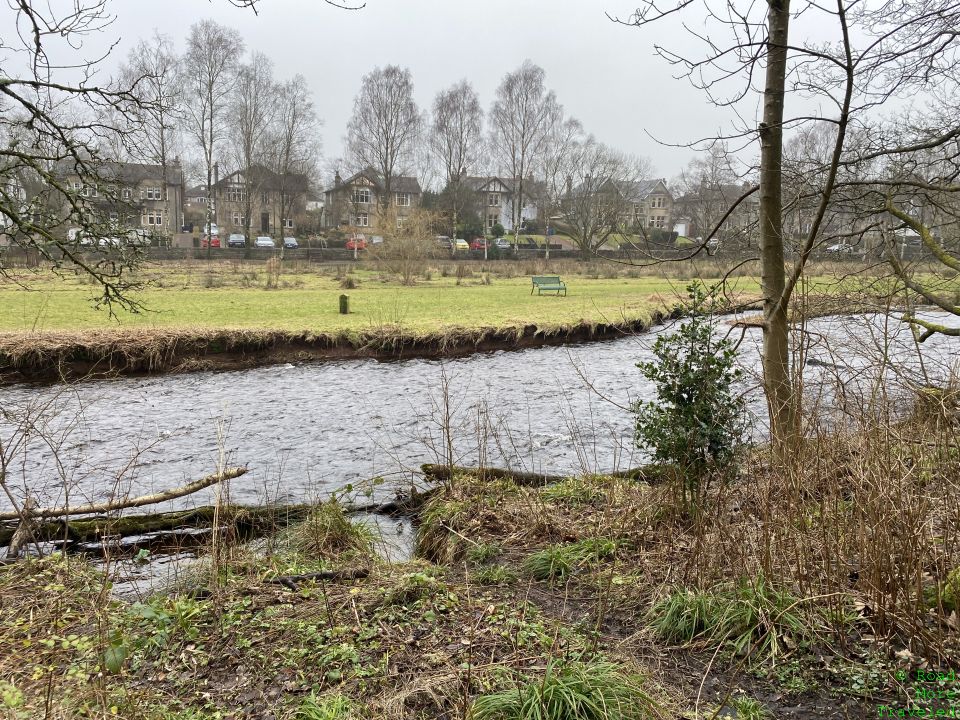
Eventually, the trail turns away from the river into Mugdock County Park. You do need to climb a somewhat steep hill here, with a nice view of town a you reach the top.
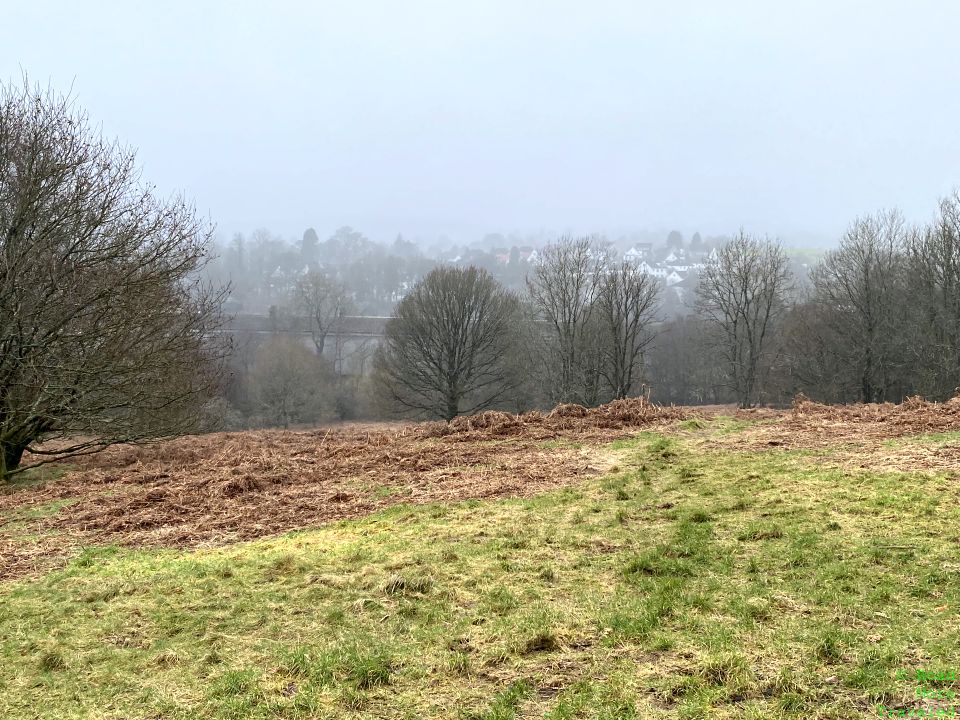
Here, the trail gets a bit rougher as you get into the countryside. Even at midday, the winter sun just isn’t all that strong this far north. The woods take on quite a foreboding feel in early February.
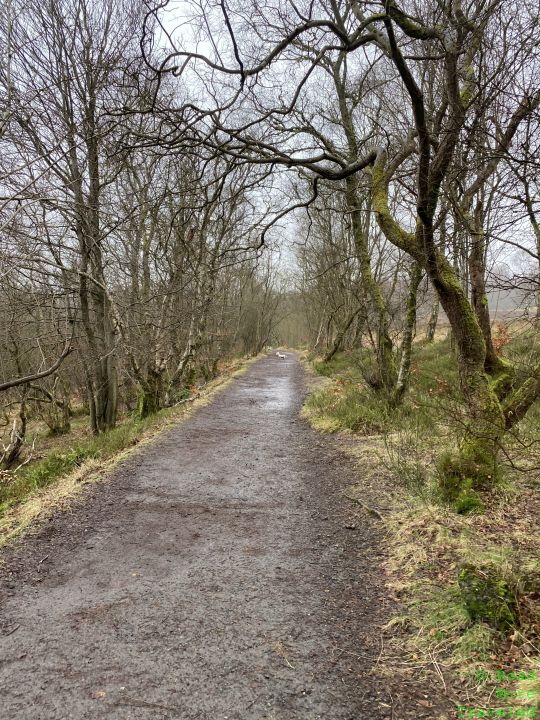
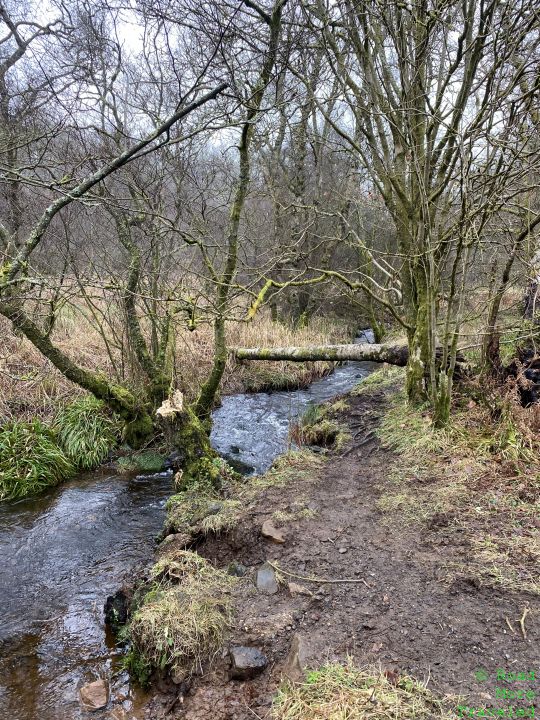
You also see the first of the West Highland Way reassurance markers along the trail.
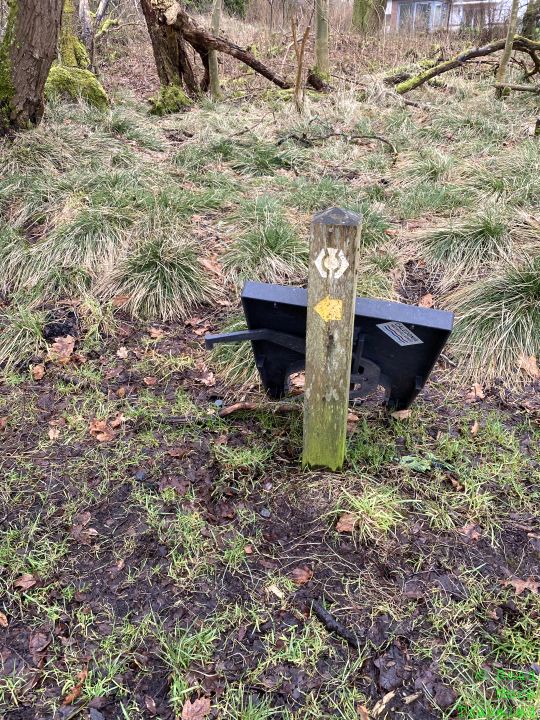
If you have time, you can take a side trip to Mugdock Castle, a castle dating to the 14th century. The castle was the home of the Clan Graham, one of Scotland’s most powerful families. While I wanted to visit, I had a 2:30 distillery tour booked, and so needed to keep moving. As you move north through Mugdock County Park, the Scottish moors really open up, with the first hills of the Highlands coming through in the distance.

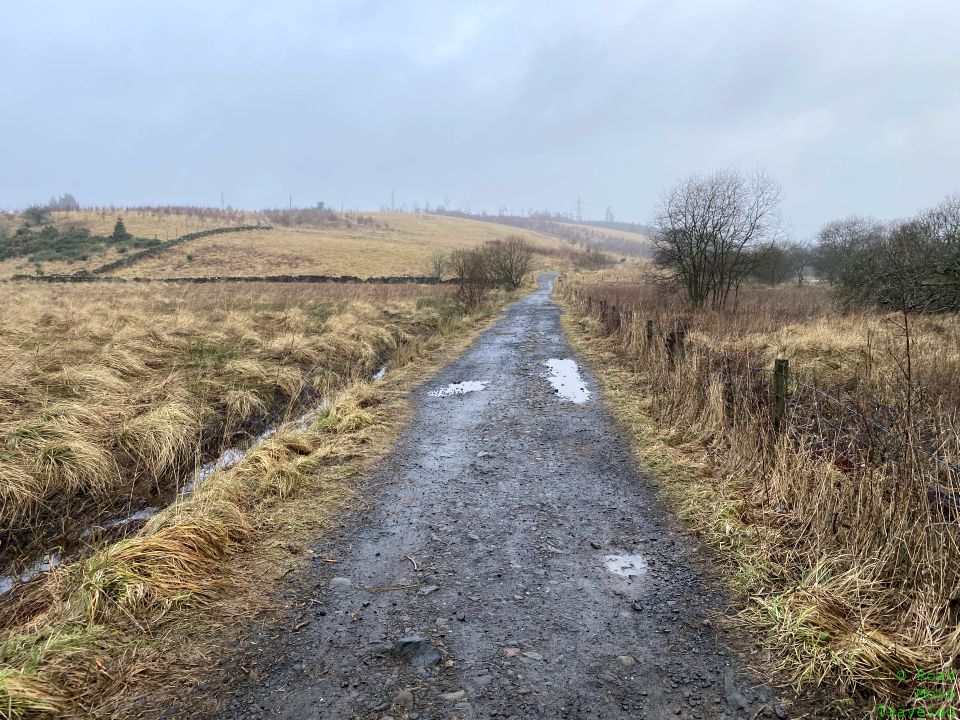
About 3 miles north of Milngavie, you reach Craigallian Loch. I didn’t linger long due to the cold drizzle, but the geese seemed to enjoy watching me.
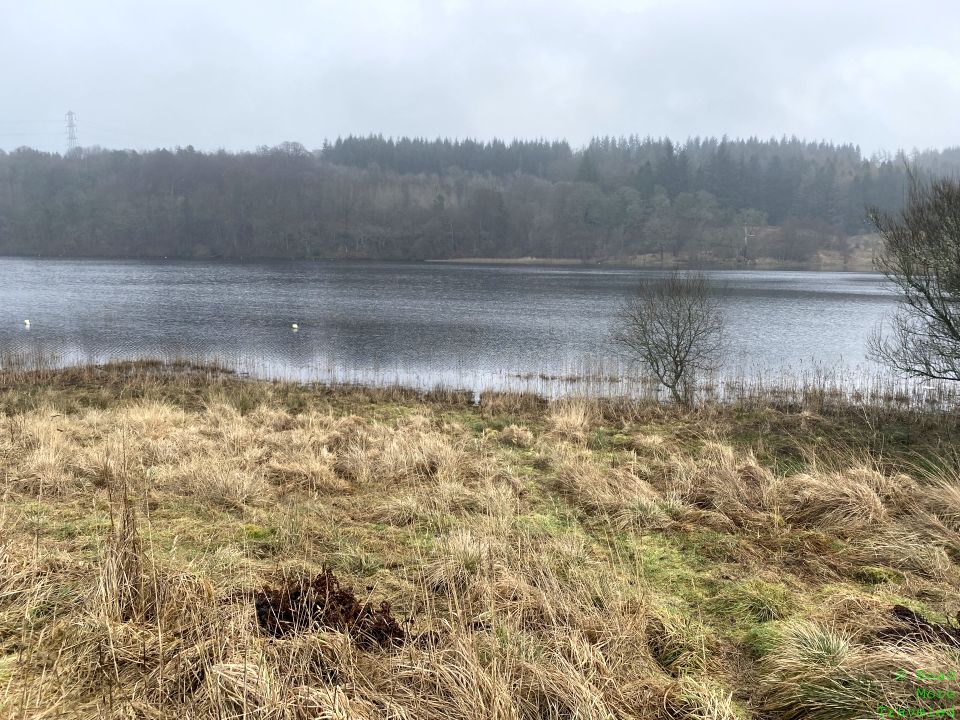
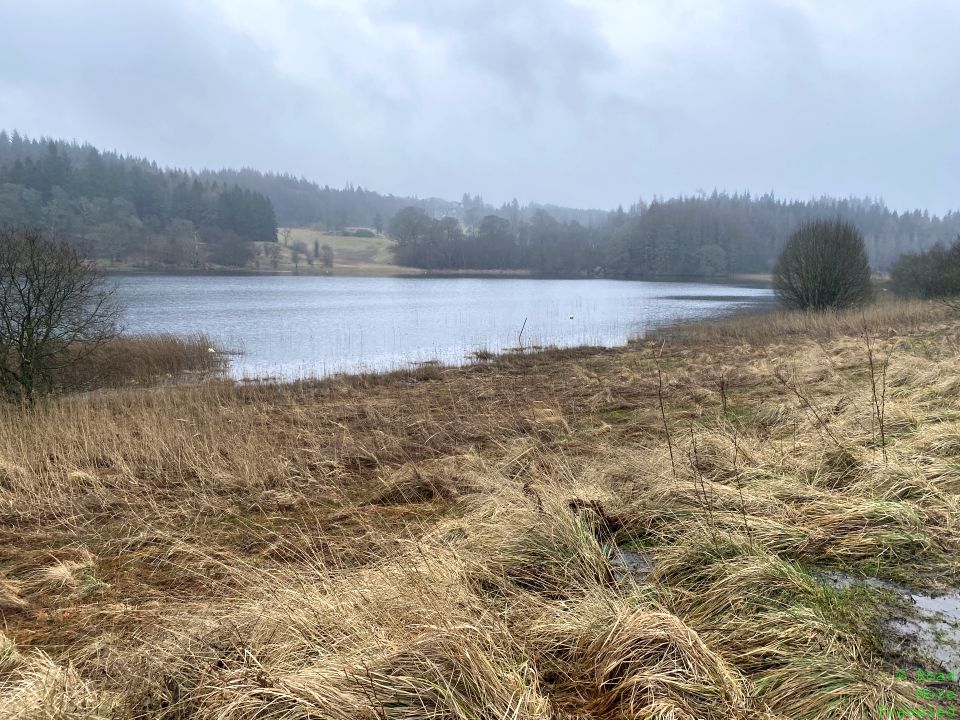
And from there on out, you really feel like you’re in the Scottish Highlands. Technically, though, you don’t cross into the “Highlands” until you pass the Highland Boundary Fault in Balmaha. Nevertheless, the scenery up here is spectacular, especially when a few peeks of sun come through the drizzle.
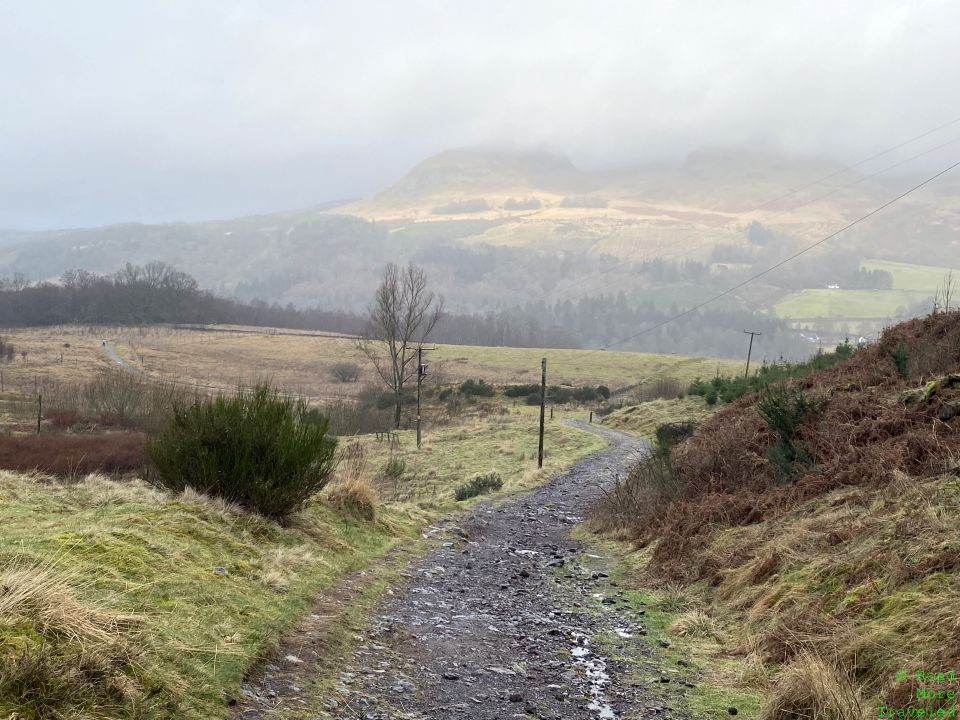
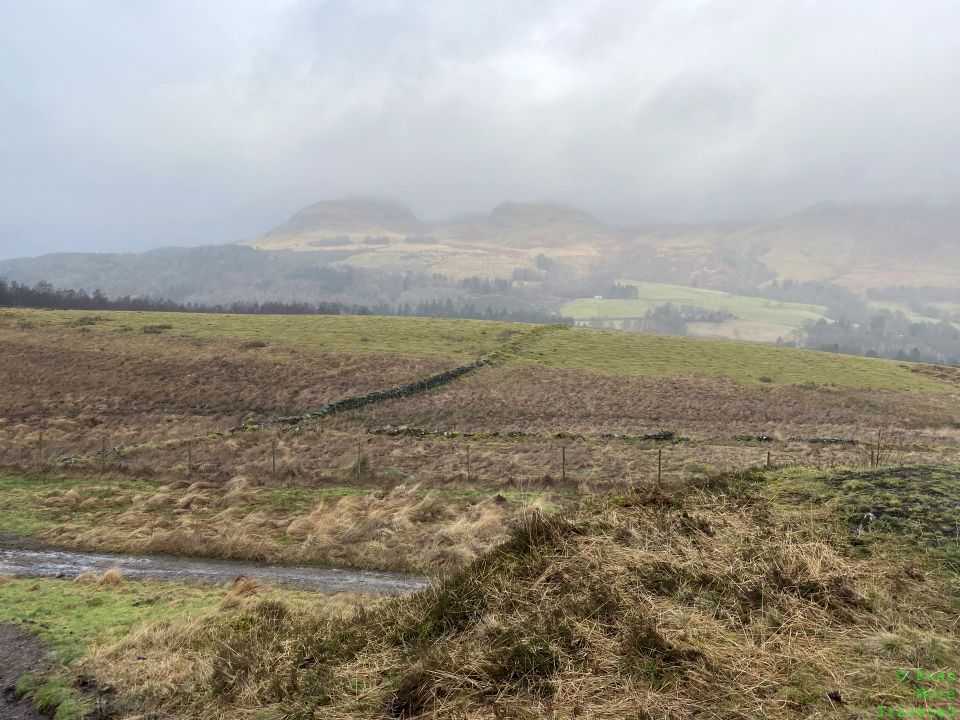
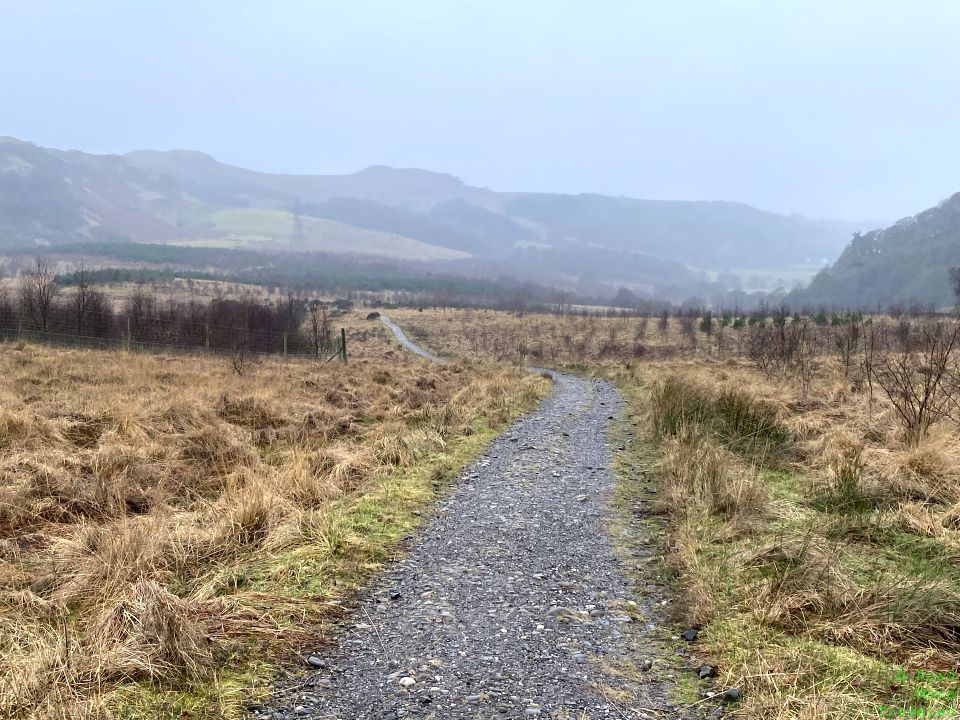
As you continue north, you start seeing a fair number of farm animals, notably sheep and the fluffy Highland cattle. It also goes without saying, watch your step anywhere the trail passes by a farm. The animals share the trail with you. And trust me, you don’t want a surprise to linger on your shoes the rest of the day.
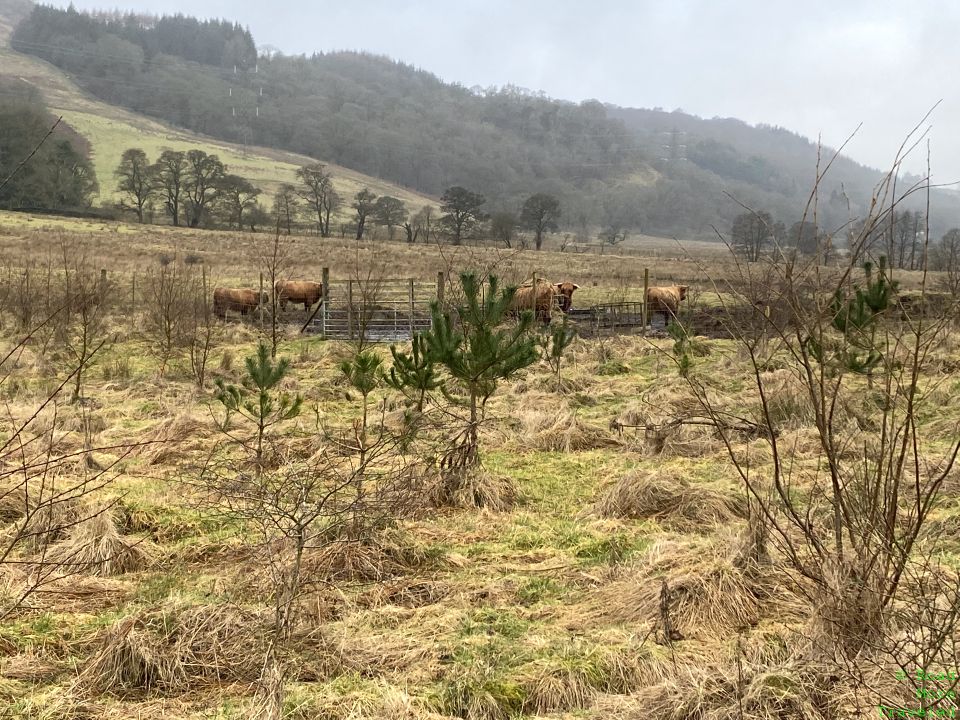
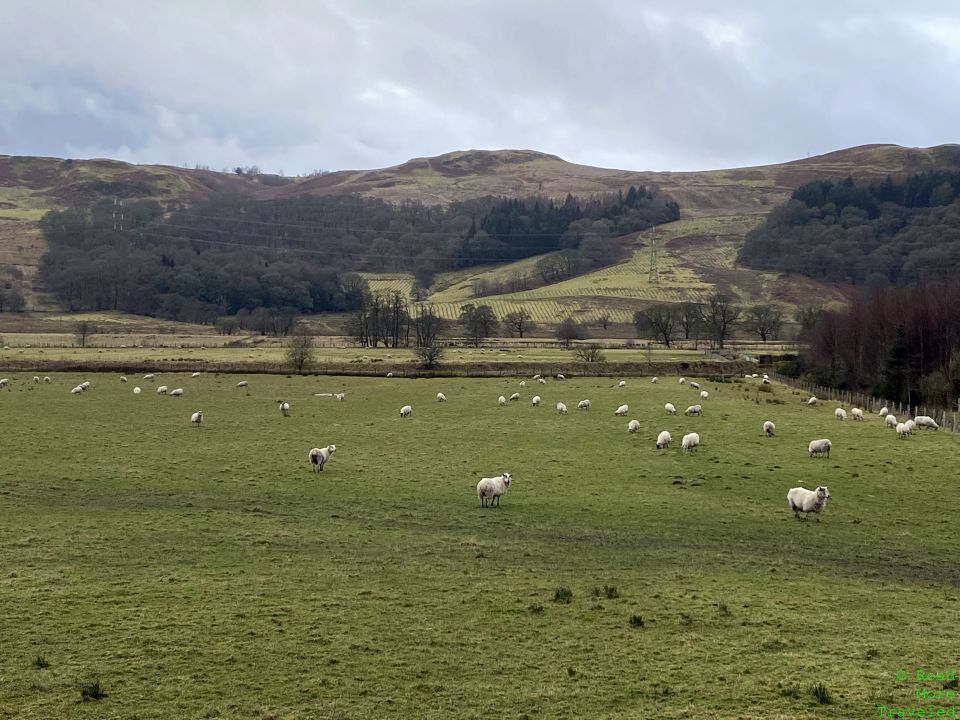
At roughly 5.7 miles from the start, you cross the Blaine Water, and the West Highland Way forks to the left. Here, I kept walking straight to rejoin the main road, the A81.
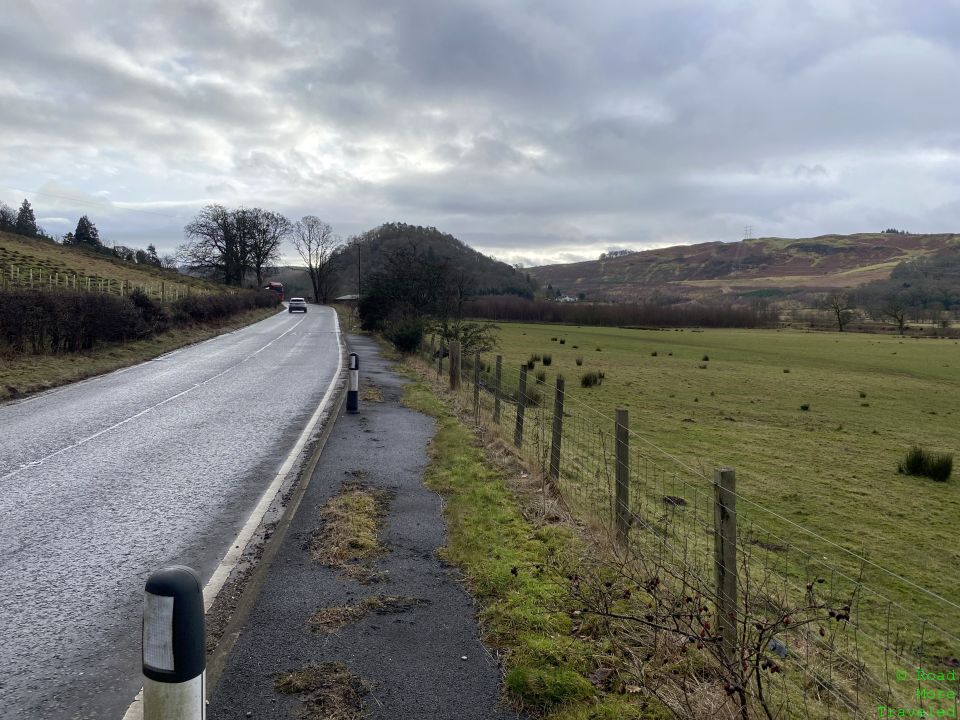
And less than a mile later, I reached my destination 6.7 miles from the start, Glengoyne Distillery. I walked pretty briskly the entire time, and the entire circuit took about 2 hours and 15 minutes. As I arrived about an hour early, I spent a few minutes taking photos of the outside of the distillery.
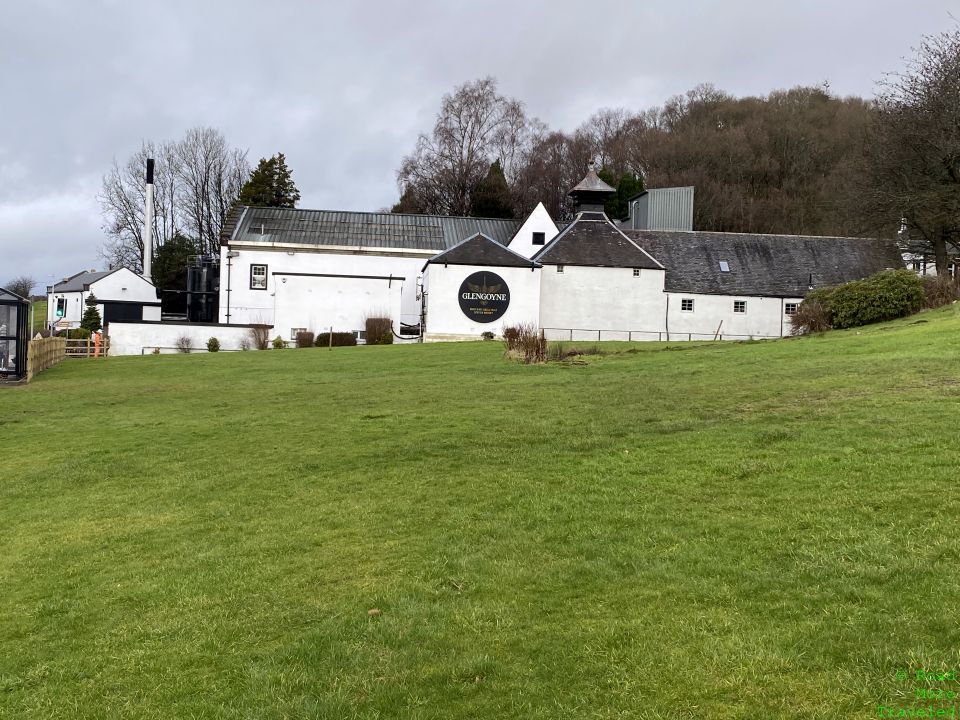
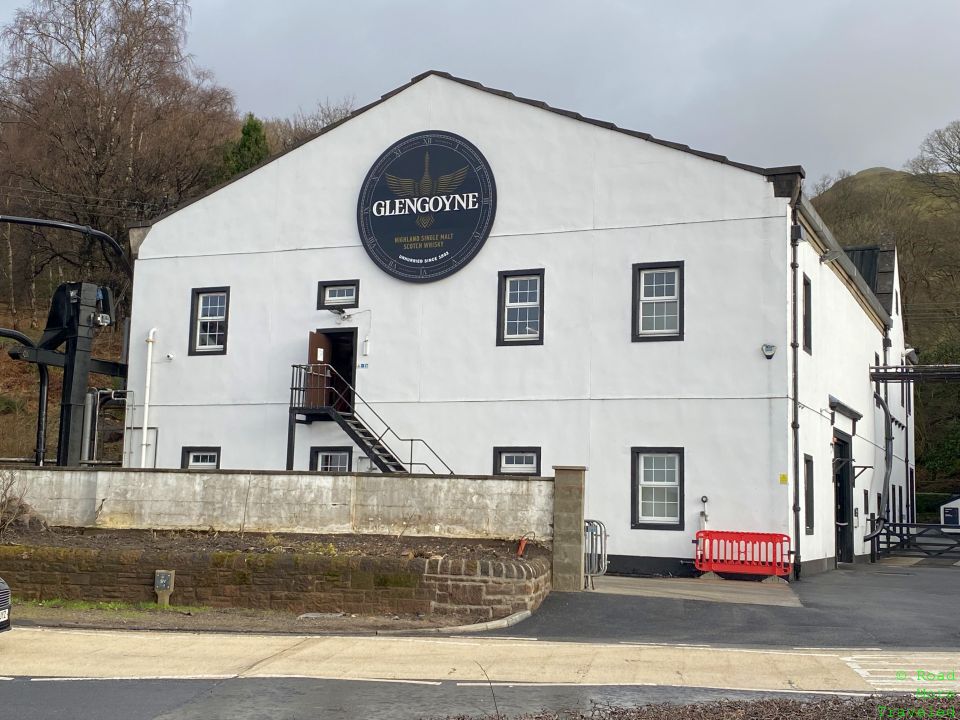
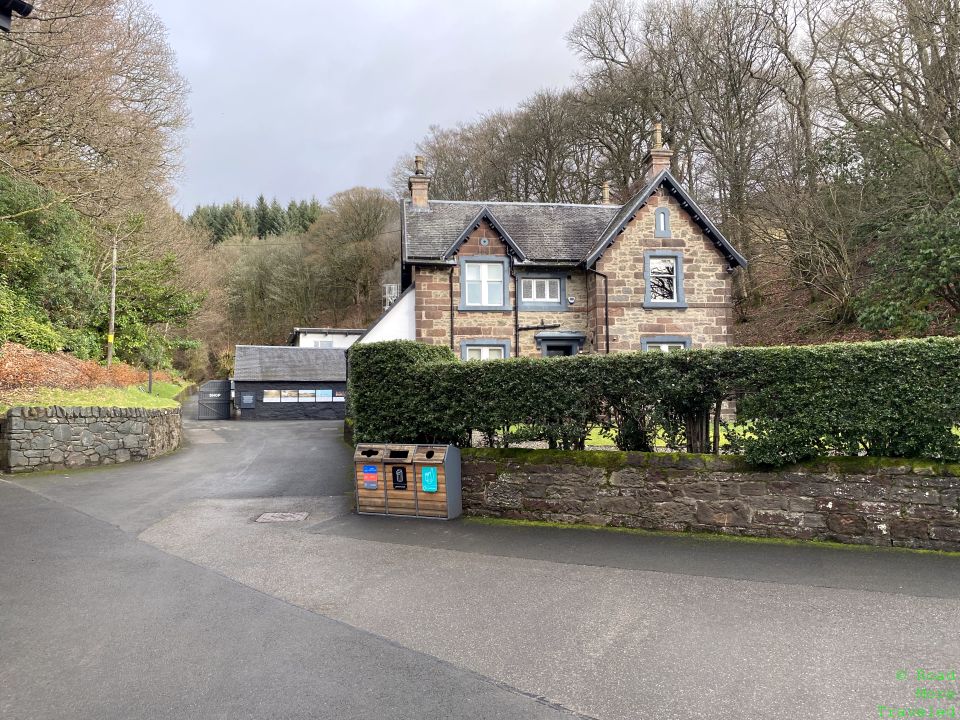
Glengoyne has the distinction as the farthest south Highlands distillery in Scotland. But wait, didn’t you just say the Highland don’t start until about 15 miles further north? Yes, but when it comes to distilleries, Glengoyne is considered a Highlands distillery. The tour guide said the road out front separates the Lowlands (on the west side) and the Highlands (on the east). Although a portion of the property lies on the Lowlands side, the actual pot stills are on the Highlands side. And so, it claims the title of southernmost Highlands distillery.
Anyway, Glengoyne offers several different tours, ranging in price from £22 to £225 per person. I booked the “Malt Master Experience”, at the time £75, but now £110. You can book a tour in advance, or take a chance day of. Given its proximity to Glasgow, Glengoyne does see a decent number of day trippers, so I suggest booking in advance. The Malt Master Experience starts like any other distillery tour, with a walk around the grounds. Though the distillery (un)officially dates to 1833, much of what you see today dates to 1966. At that time, the entire distillery was rebuilt to triple capacity due to soaring demand for whisky.
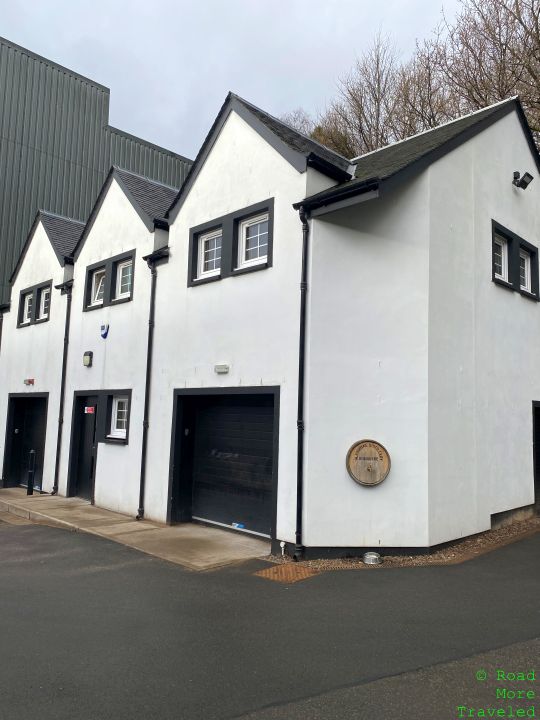
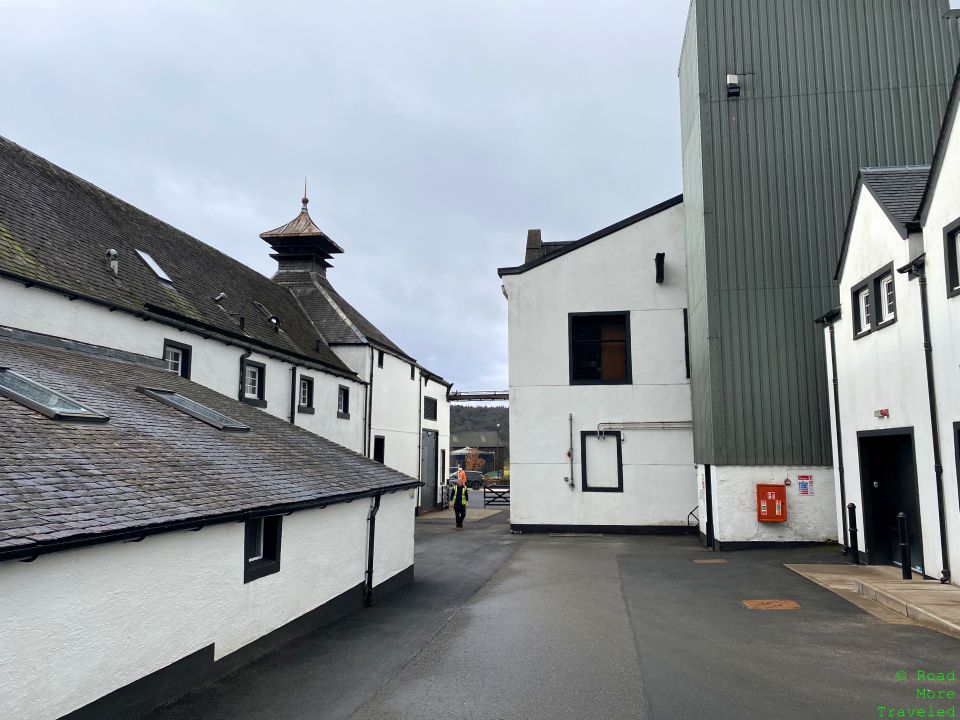
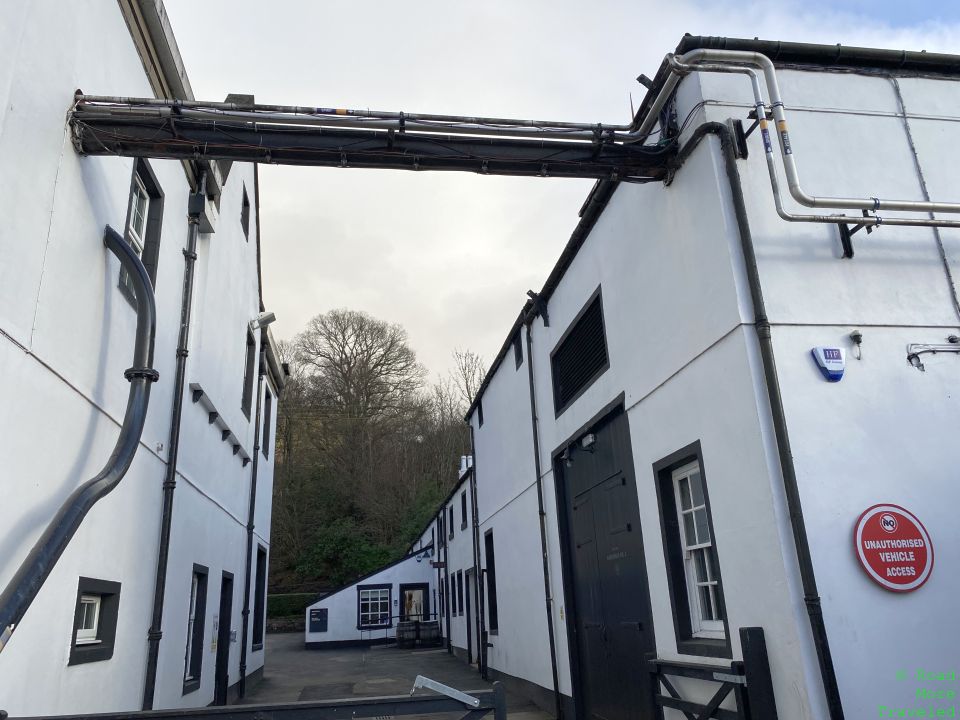
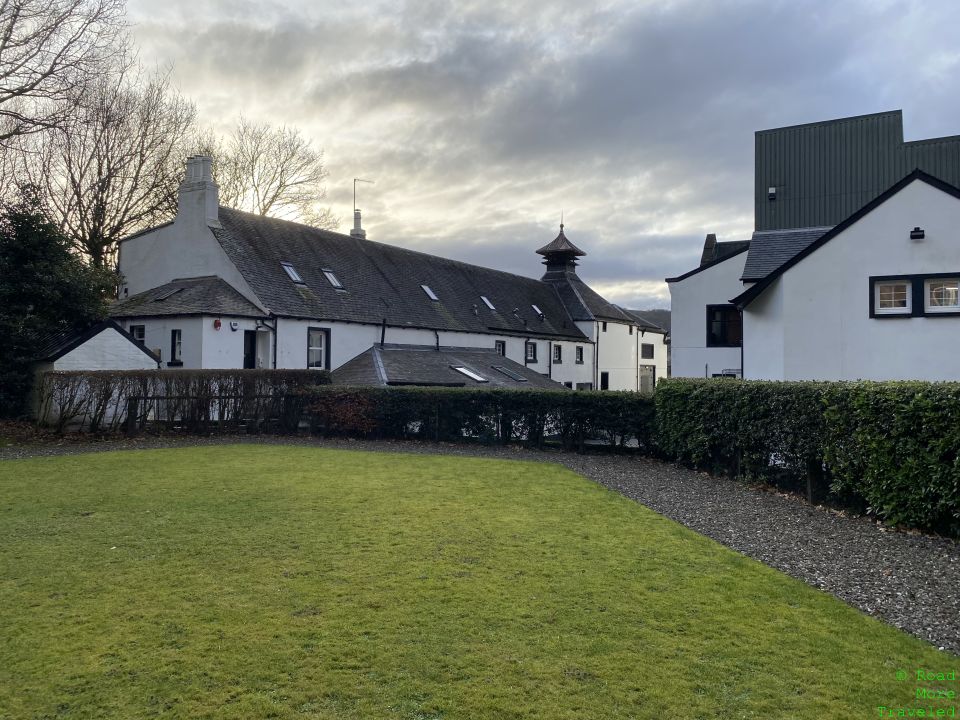
The tour then briefly heads across the road to see the warehouse, where you can read several signboards detailing the history of the distillery.
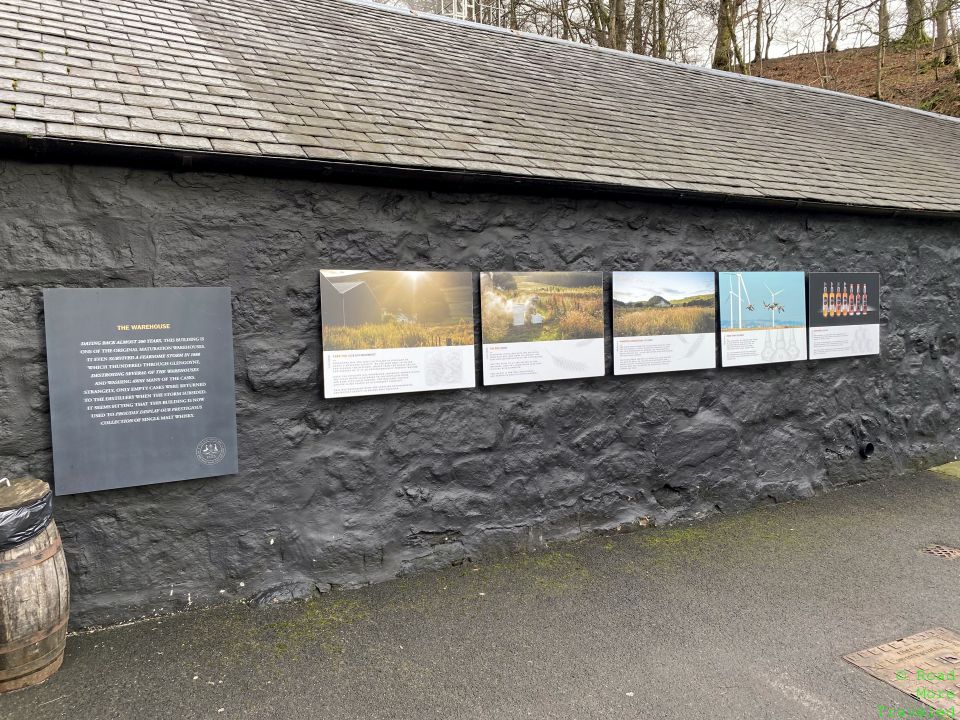
Then, the tour heads back across to view the inside of the distillery itself. Here, you learn about the whisky distillation process from start to finish. Exhibits show how barley is selected and roasted, slow distilled in copper pots, and finally aged casks. Note that Glengoyne prohibits photography inside the building, but they do let you take a quick photo of the pot stills from outside.
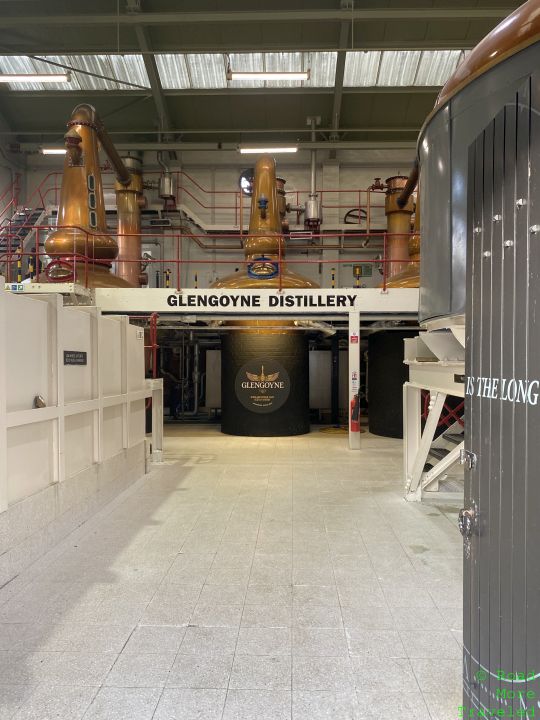
Glengoyne claims it uses the slowest distillation process of any Scotch whisky. Hence the brand’s catchphrase, “Unhurried Since 1833”.
Following a tour of the facilities, guests enjoy the main whisky tasting. The tour guide takes you to a storage room containing several sample casks, along with whisky samples of various vintages. Glengoyne uses both American and European oak sherry and bourbon casks to age its whisky. The company claims these casks take six years to prepare, which results in the deep colors of its whisky.
Each bottle represents one year of aging, with 10 per row, and 30 total. You can see the European sherry casks produce the most robust color. In case you’re curious, that 30 year vintage sets you back a cool £999.

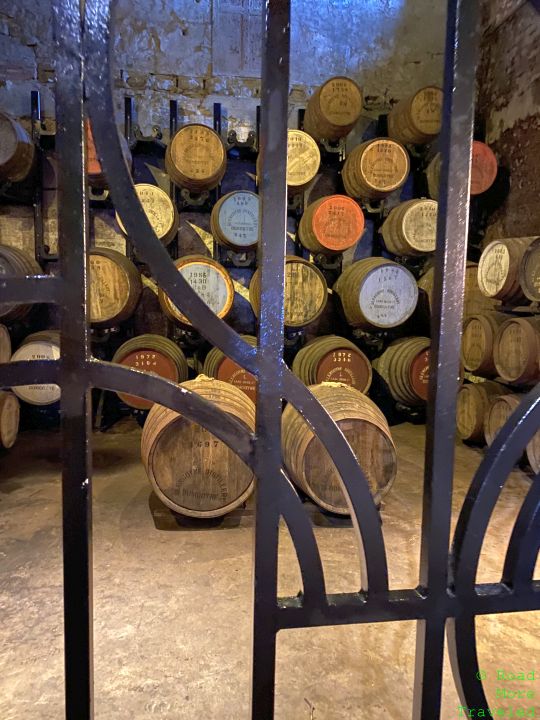
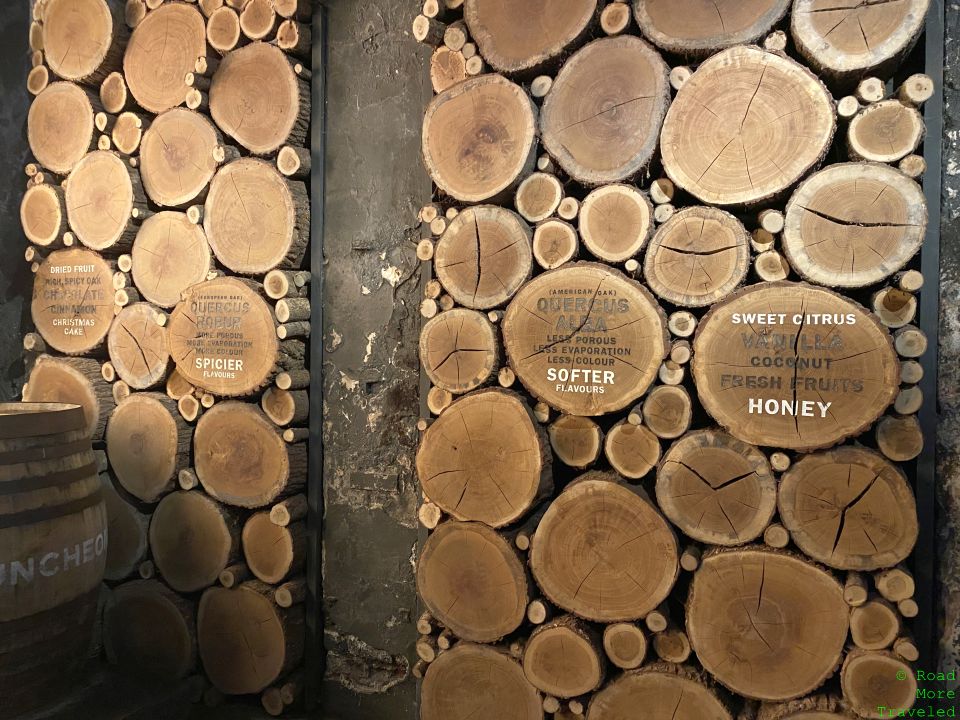
The tasting provides samples of a 10, 12, 15, and 18-year old whisky, along with one “cask strength” sample. What’s the difference with cask strength? It comes straight from the cask without dilution, resulting in 55% or more alcohol by volume. That compares to the typical 40-45% for standard Scotch whisky. That’ll leave a mark!
Upon completion of the still and storage area tour, the real show for the Malt Master Experience begins. You start by heading over to the special tasting room in the Burnfoot Lodge.
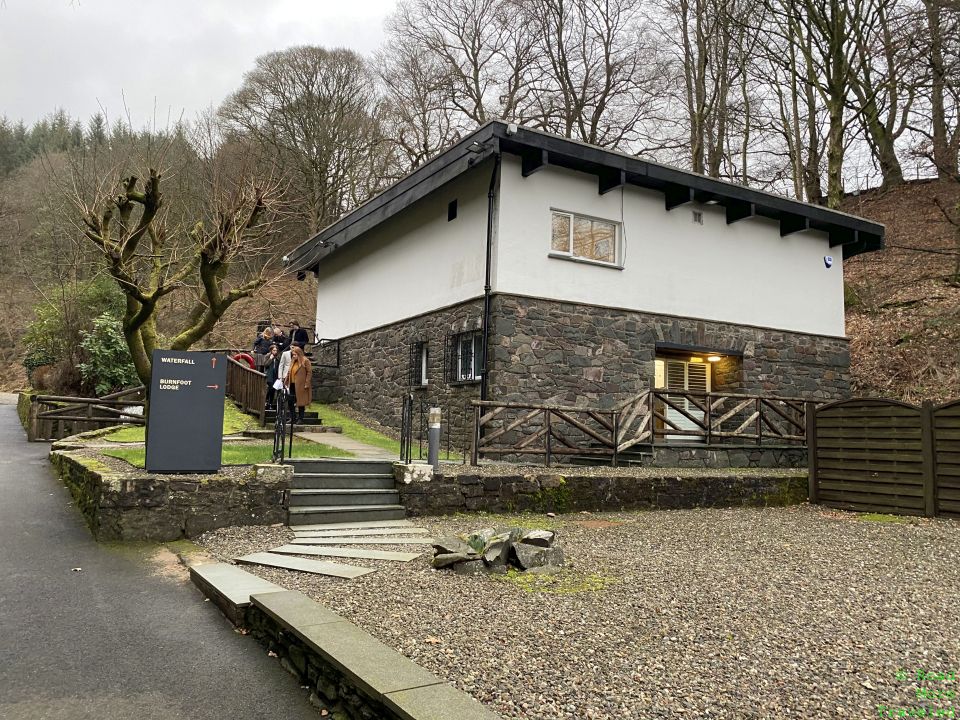
Here, you’re presented with samples of five cask strength whiskys – to make your own blended Scotch whisky! This is apparently the only distillery in Scotland that offers such an experience. Guests are encouraged to try, then mix and match the various sample to their liking. Once you find a combo you like, you bottle it up in the 200 ml bottle provided to take home. You can keep it at cask strength, or dilute with water to drop it to the usual 40-45%. I ended up mixing 20% of sample 2/20% of sample 4/40% of sample 5 for my take-home prize.
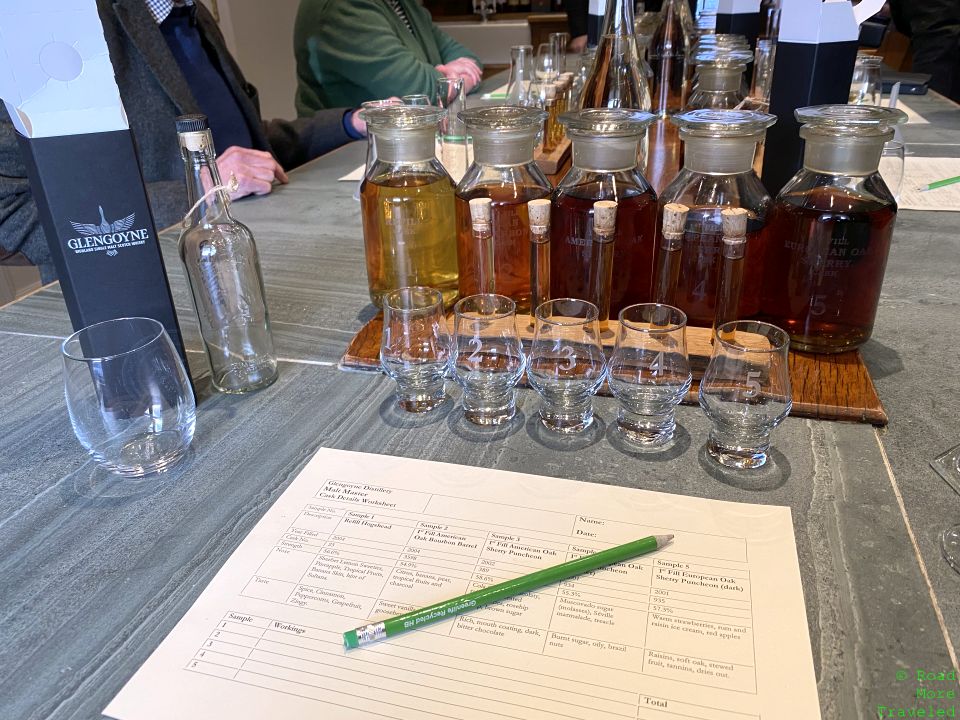
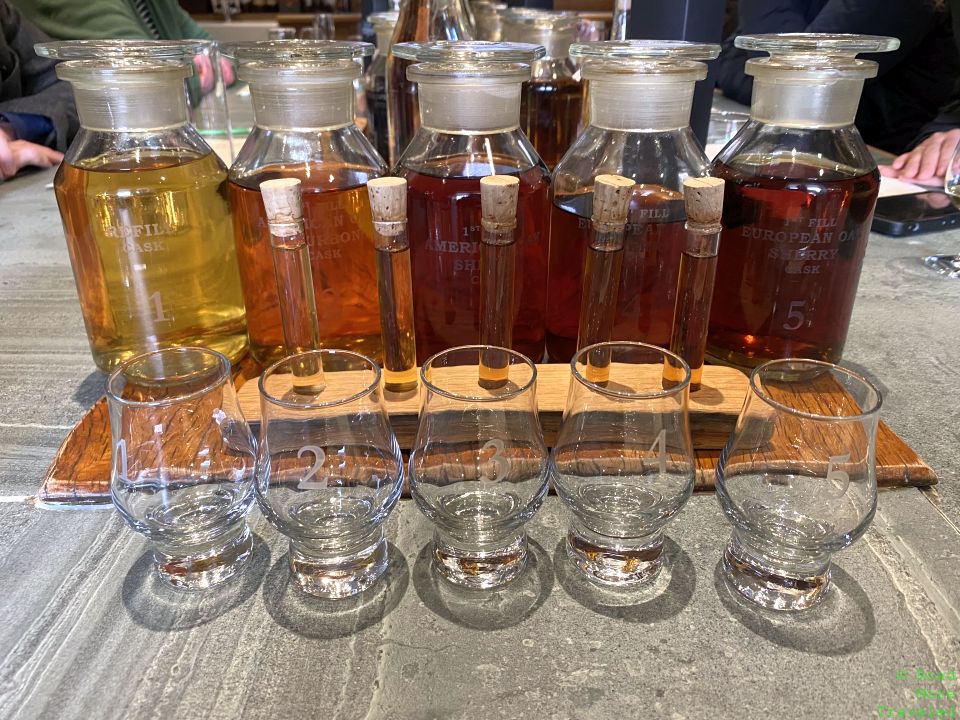
Each participant is also given a scoresheet of sorts to track their unique recipes.
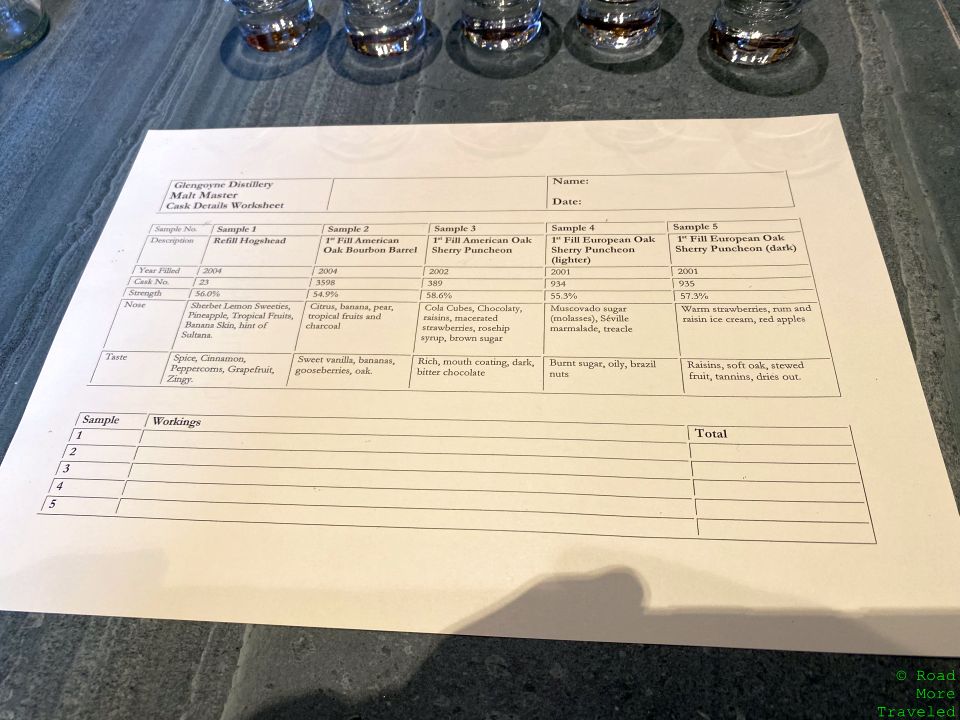
To finish up, you can take a look at the small waterfall out back. Supposedly, prior to the distillery’s official opening in 1833, Glengoyne’s founder, George Connell, would hide behind the waterfall to avoid the attention of the authorities.
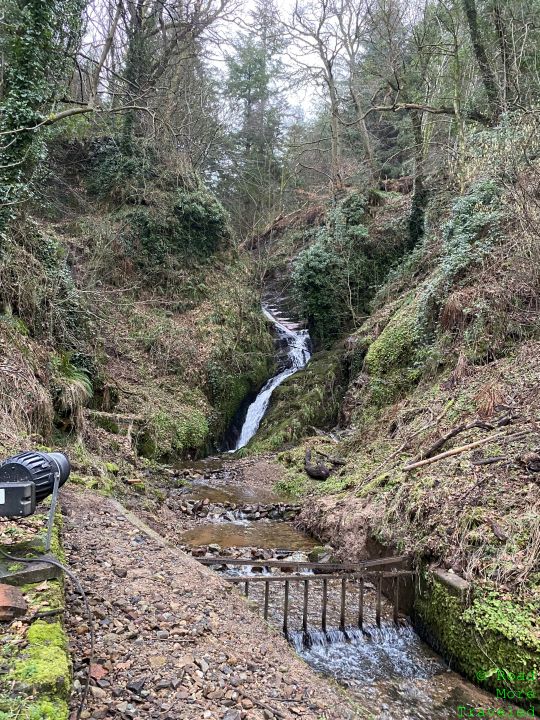
After buying a couple of bottles at the gift shop, I headed to the bus stop to return to Glasgow. And what a sight to behold – a sunset over the Highlands!

Once the bus showed up, I grabbed a seat on the upper deck to enjoy the view.
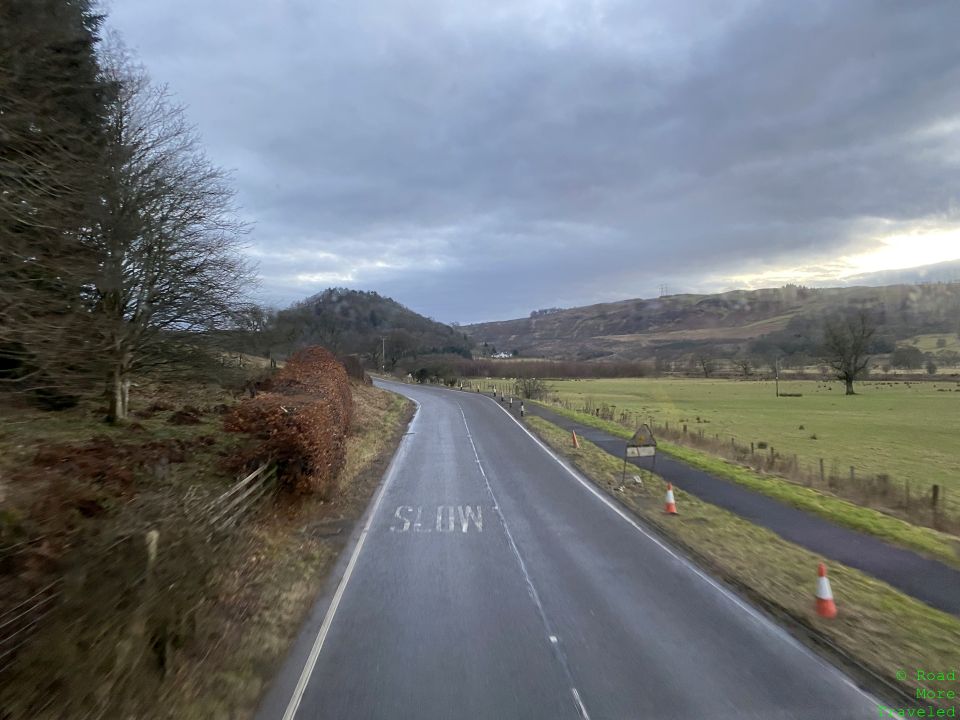
Bonus coverage – after getting back to Glasgow, I decided to check out a traditional Scottish pub. And there was a good one not far from my hotel, The Piper Whisky Bar. The Piper’s claim to fame is that they stock one whisky from every Scottish distillery, over 300 in total. I ordered the “Whisky Galore” flight, a sampling of three 15/16 year malts for £21.95. The selection consists of a Glenfarclas 15 (Highland), a Glenfiddich 15 (Speyside), and a Lagavulin 16 (Islay).
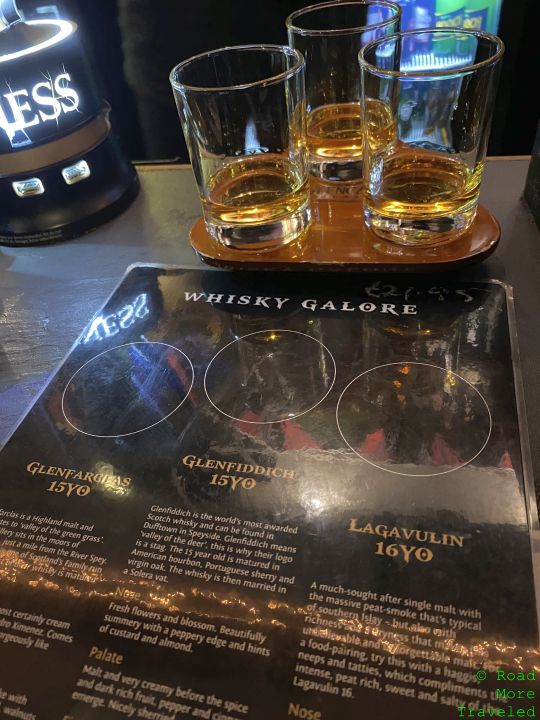
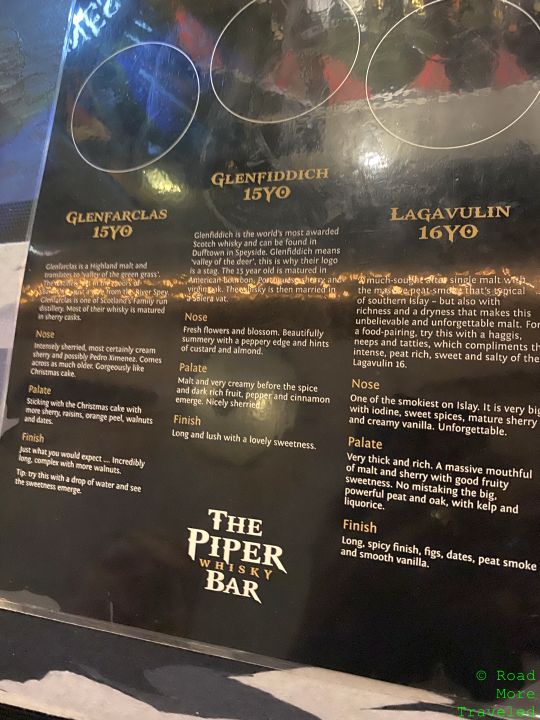
Going in, I figured I’d like the Lagavulin the best, as I like a good smoky, peated whisky. But this one was a bit much for me. I actually enjoyed the smooth, creamy Glenfiddich the best. In the meantime, a couple of locals sitting next to me approved of the selection. Certainly a compliment of the highest order. (They were also rightly amused that someone would actually fly to Glasgow from Dallas for a weekend to try a whisky flight…)
Final Thoughts
Looking for a quick introduction to Scotland’s famous West Highland Way? The first seven miles gives you a good intro to the 96-mile trail, with a good distillery tour to boot. It’s a good, easy itinerary if you only have a couple of days in the Glasgow area.
